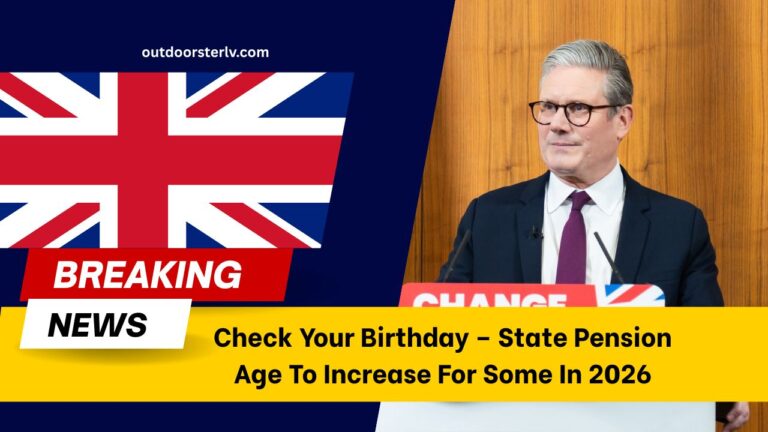The State Pension age in the UK is currently 66 for both men and women, but changes are coming that will affect millions. From 2026 to 2028, the age will gradually increase to 67 for people born between 6 March 1961 and 5 April 1977.
This shift has been in legislation for years and is designed to keep the pension system sustainable as life expectancy increases. A further rise to 68 is planned between 2044 and 2046.
If you were born in the affected range, your retirement income from the State Pension will start later than you may have expected—making it important to check your exact eligibility date now.
Why the Pension Age is Increasing
Several factors are driving the change:
- Longer life expectancy, meaning people spend more years drawing a pension.
- An ageing population, which increases pressure on government spending.
- Regular reviews of the pension system to ensure it remains fair and financially sustainable.
- The aim is for people to spend a proportionate amount of their adult life in retirement, rather than significantly more than past generations.
Who Will Be Affected?
The increase will not happen overnight—it will be phased in gradually. Your exact State Pension age depends on your date of birth.
State Pension Age Changes
| Date of Birth | New State Pension Age | Notes |
|---|---|---|
| 6 March 1961 – 5 April 1977 | 67 | Will reach pension age upon turning 67 |
| 6 April 1960 – 5 March 1961 | 66 + additional months | Increase phased in by adding months to age 66 |
| After 5 April 1977 | 68 | Further increase scheduled between 2044–2046 |
For those in the transition group, the rise means waiting several extra months—or up to a year—before receiving the State Pension.
What This Means for Retirement Planning
A change of several months to a year might seem small, but it can have a big impact if you were counting on that income to start at 66. This could:
- Delay your retirement plans.
- Require you to bridge the gap using savings or other pension income.
- Prompt a review of your financial strategy to account for the later start date.
The Department for Work and Pensions (DWP) will notify everyone affected in advance, but you don’t need to wait—there’s an online tool available to check your exact State Pension age.
How to Check Your State Pension Age
Your State Pension age is the earliest date you can start claiming your State Pension. This may differ from when you can access a workplace or personal pension.
You can use the online State Pension age checker to find:
- The exact date you will reach State Pension age.
- Your Pension Credit qualifying age.
- When you can get free bus travel (at 60 in Scotland).
Checking now will give you a clear picture of your timeline and help you make informed retirement plans.
Boosting Your State Pension Payments
If you’re approaching pension age, you can maximise your future payments by making sure you have enough National Insurance (NI) qualifying years.
Key points:
- You need at least 10 qualifying years to receive any State Pension.
- You need 35 years for the full new State Pension.
- You can fill gaps by paying voluntary NI contributions—but only for the past six tax years (with some temporary extensions available).
- Some people can get NI credits without paying, for example if they were caring for family, unemployed, or receiving certain benefits.
The current extended deadline to pay voluntary NI contributions for gaps back to 2006 runs until 5 April 2025. After that, the usual six-year limit will apply.
Steps to Prepare
- Check your birthdate against the new schedule to see if you’re affected.
- Review your NI record to make sure you’re on track for the full State Pension.
- Consider your retirement income sources—workplace pensions, savings, investments—to bridge any gap.
- Adjust your plans for the later pension start date if needed.
- Stay updated on any further reviews or announcements that could alter the pension timetable.
From 2026, the State Pension age will start rising from 66 to 67 for people born between 6 March 1961 and 5 April 1977. While the change will be gradual, it can still have a significant effect on your retirement timing and income planning.
Checking your exact State Pension age now, making sure your NI record is complete, and adjusting your savings or pension strategy can help you prepare for the shift and ensure a smoother transition into retirement.
FAQs
Will I still get my State Pension at 66 if I was born in early 1961?
Not necessarily—if your birthday is between 6 April 1960 and 5 March 1961, your State Pension age will be 66 plus several extra months.
Can I claim a private pension before my State Pension starts?
Yes—many private and workplace pensions allow you to access funds earlier, often from age 55, though this depends on your scheme’s rules.
How many years of NI contributions do I need for the full State Pension?
You need 35 qualifying years for the full amount, and at least 10 years for any State Pension at all.

